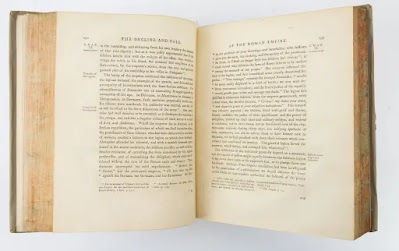One of the coolest things about reading science fiction, aside from the potentiality of falling in to a great tale, is that on occasion a “great idea” – crazy, weird, mind-altering, world-expanding, awe-inspiring – a great idea will pop up and sweep me off my feet. Unfortunately it doesn’t happen very often, but it does happen. A couple times a year, I guess, for someone like me who reads science fiction about twenty, twenty-five percent of the time.
This just happened a few days ago.
You may know I am working my way through 18th century
historian Edward Gibbon’s The History of the Decline and Fall of the Roman
Empire. It’s a 1,270-page bucket list item that’ll take me about four
months to march through. Now, since I’m a hopper and I’m determined to finish this
tome before Little One returns from Italy, I’m only going to allow myself two science
fiction short stories for every hundred pages of Gibbon I milepost.
So I just read two stories from 1991’s Modern
Classics of Science Fiction I picked up just for this occasion. It was in
the second one, “Aristotle and the Gun,” by L. Sprague de Camp, that a small
idea wormed itself into my mind and refuses to leave.
First, a word about Mr. de Camp. Or L. Sprague. I’m
not sure how to refer to him. He was a writer from the pre-Golden Age of Science
Fiction, primarily the 30s and 40s. This is only the third short story of his I’ve
read (each one from a different sci fi omnibus read in a different decade), but
I did read his novel Lest Darkness Falls way way back in 2005 and
thoroughly enjoyed it (I graded it an A-). The essence of the tale is – what would
you do, with your knowledge and know-how, if you were transported back to Rome c.
AD 550, as the city falls to the barbarians and the world teeters on darkness.
A meek, run-of-the-mill archaeologist finds himself mysteriously in such a
situation, and what follows is, well, what he does, and what he does, simple at
first, turns out quite remarkable.
“Aristotle and the Gun” (1956) is of a similar idea. In
the far distant future a scientist teleports himself back in time in attempt to
meet Aristotle and subtly influence the philosopher so that the scientific age
can happen half a millennia sooner that it did in his timeline.
The main character mentions that classic nagging
problem that pops up in every time travel story: How much effect will one teeny
tiny change in the past alter the future? A.k.a., the butterfly effect. The
nifty part is that he states that the extent of the butterfly effect is directly
correlated to whether space-time has a negative or positive curvature. “If
positive, any disturbance in the past tends to be ironed out in subsequent
history, so that things become more and more nearly identical with what they
would have been anyway. If negative, then events will diverge more and more
from their original pattern with time.”
Now I never thought about the universe’s curvature relating
to time. I always thought of it, way back in my physics days and since,
in terms of space. After all, space is a physical thing, at least that can
be curved. How can time curve? A positively curved universe can be imagined as
a great sphere whereas a negatively curved universe is like a horse saddle. But
since space and time are connected into one four-dimensional entity care of
Einstein, spacetime, one must think of time as positively or negatively
curved.
When reading the story I immediately thought of the difference
between a closed and open universe, as in a universe which will eventually collapse
upon itself as opposed to one which will continue to expand forever. Which fate
is realized depends on the amount of mass in the universe, as mass works as a
brake on expansion. Curvature itself, though, does not necessarily influence
whether the universe is bounded or unbounded, closed or open. But wouldn’t it
be cool if somehow mass also affected the flow of time? I mean, it must,
right, since it’s right there in the term spacetime.
(And I think it must be in Einstein’s relativity equations, if I remember correctly. It’s been a while ... a long while ...)
I dunno; I think I just gave myself a headache. Someone
give me a million dollars so I can quit my job and think about these things, okay?










